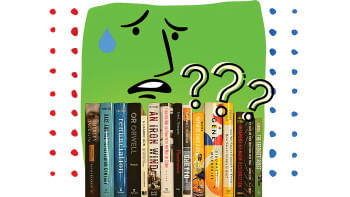What’s stopping us from reading books?

There was once a time when separating me from a book was similar to the process of unscrewing a tightly sealed jar. At some point the parents had to give, since there was not a single thing on earth getting between me and the chapter that I'm aaaalmost about to finish—before I could start doing anything else.
And I'm sure you can guess where this story goes.
Now I spend days kicking myself over why I can't remember the last time I finished a book. I end up thinking that maybe I'm just addicted to my phone, numbing my brain with a gazillion pieces of content everyday. Maybe I don't have the same attention span or patience that I used to and maybe, all of these are just excuses. But the burgeoning question remains: how did I get here? And can I unleash the wee bookworm that could devour books back?
A 40-year study conducted between 1955 and 1995 on trends of leisure reading within the Dutch population found that an average person's reading time reduced to half, especially during the initial phase of television (1955–1975). It also found that the combination of paid work and domestic tasks among the post-war generations, and the increasing diversity in leisure activities, also resulted in the decline.
How true are the findings of this study to the readers of today? Are these aforementioned issues keeping them from their favourite books as well? If so, what are they doing to counteract it?
To find these answers, I ended up talking to a few bookworms around me.
Sushmita S Preetha, head of Editorial and Op-ed at The Daily Star, said, "The state of mind required to read has been missing for me lately. I read so many articles per day that when it's time for me to actually relax, which is usually around 10:00pm, I'm too exhausted to put in the effort to read a book."
"Earlier, I would start a book and read it through the day or the weekend or even during Eid holidays. But now, these fragments of 'free-time' are preoccupied with 200 other tasks, cleaning the house, getting the baby ready, and visiting relatives. So it's just easier to watch something as opposed to reading a book," she explained.
Aaqib Hasib, sub-editor at the entertainment desk of The Daily Star said, "We usually work so many hours a day that there's very little time to do anything else. In general, anyone working 5 days a week in Dhaka is severely exhausted, which is why it's just easier for most to shift to consuming content that doesn't require a lot of processing."
The availability of so much content doesn't help a reader's case. There's also the point of gratification—when you watch something for an hour, you end up extracting more information than you do with the effort of reading 30 pages, and that is something I feel is psychologically intervening with our reading processes", Hasib said.
"When faced with the option to watch a YouTube video that sums up All Quiet on the Western Front and finish reading the book, which is likely to take months, what is the consumer more likely to choose?" Noshin Saiyara, a student of Connecticut College, asked me.
"Besides the hype that I see surrounding the release of a new TV show is one that would exist for books as well, even till 2014-15. But you don't see a similar hype generated for new book releases anymore," she added.
Naziba Basher, actor and sub-editor at The Daily Star, said, "When it's shoot day and I'm getting some spare time on my hands, I end up finishing multiple chapters of a book. But when I try to continue where I left off from home, I'm unable to do that. Having to read so much at work affects my reading habits at times.".
"Although reading was a regular habit for me till university, I lost a lot of that ability to social media. I got it back again during the pandemic. And since then, I'm following this routine of reading at least some pages before sleeping," Tabassum Islam Susmi, an Erasmus scholar, shared when asked how she rebuilt her reading.
"Some other things helped too. It might sound silly but now I'm one of those people who attends book club gatherings and takes some sort of book everywhere."
She added, "I'd say, with adulting and the reduced attention spans we have now, losing the habit of reading is understandable. But if someone really wants to regain it, it's difficult, yes, but totally doable.".
Nazifa Raidah is a sub editor at The Daily Star.

 For all latest news, follow The Daily Star's Google News channel.
For all latest news, follow The Daily Star's Google News channel. 









Comments